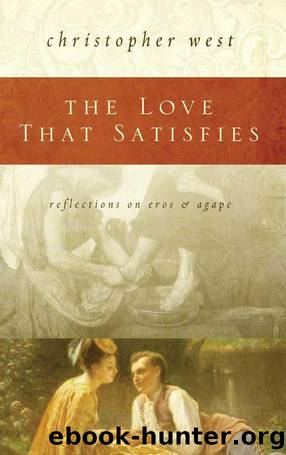The Love That Satisfies by Christopher West

Author:Christopher West [West, Christopher]
Language: eng
Format: epub
Publisher: Ascension Press
Published: 2010-12-05T16:00:00+00:00
Chapter 6
GODâS EROS
35. âThe divine power that Aristotle at the height of Greek philosophy sought to grasp...does not love: it is solely the object of love. The one God in whom Israel believes, on the other hand, loves with a personal love...and his love may certainly be called eros, yet it is also totally agapeâ (n. 9).
Philosophy can know that God exists. It can even discern certain things about the divine power at the source of existence. But can we conclude without the aid of Godâs self-revelation (without biblical faith) that God loves? Aristotle could conclude only that the divine majesty is to be loved. He did not discern that the divine power not only loves but is love. Christ is the fullest revelation of this eternal truth. And Christ came as a Bridegroom to give up his body for his Bride, the Church, and for all humanity. Since the love of a bridegroom for his bride involves eros, Benedict affirms that Godâs love âmay certainly be called eros.â
This, it seems to me, is the most provocative assertion of Benedictâs entire letter. In fact, as a reader of numerous papal documents, this is one of the boldest statements Iâve ever read from a pope. Never, to my knowledge, has a pope stated so plainly and certainly that Godâs love is not only agape but eros. For those familiar with the Bibleâs erotic imagery, this shouldnât come as a surprise. A widespread angelistic piety, however, is decidedly uncomfortable with such imagery. God loves with eros!? Is this not an affront to God? Shouldnât we recoil? Is this not somehow a degradation of his divinity, an entrapment of Godâs Spirit within the material world and a blasphemous projection of the human onto the divine? It could be, and would be, if it did not flow from a biblical vision of eros liberated from lust and from a deep well of respect and awe before the mystery of the Incarnation.
Herein lies the scandal of the Christian claim: God reveals his divine love through a human heart: the âsacred heartâ of Jesus, the Christ, the God-Man. In other words, God reveals divine love through human love. It is only from âwithinâ the logic of the Incarnation that Benedict can declare that Godâs âlove may certainly be called eros.â Yet, as he himself adds, pressing yet again into the unity of the divine and human natures in Christ without blurring the distinction, âit is also totally agape.â This also marks the path of sanctification for Christian men and women: eros, through a progressive growth in holiness, must come more and more to express agape. And this is the path not only for spouses but for everyone, regardless of vocation. Everyone in the unity of body and soul as male or female is called to love as God loves, that is, with an eros that âis also totally agape.â
It follows, then, that eros cannot be limited to its genital expression. Eros implies a yearning for all that is true, good, and beautiful, a yearning that cries out for expression.
Download
This site does not store any files on its server. We only index and link to content provided by other sites. Please contact the content providers to delete copyright contents if any and email us, we'll remove relevant links or contents immediately.
The Enemy by Sarah Adams(1397)
The Switch by Beth O'Leary(1396)
Sisters by Daisy Johnson(1363)
Guard Duty by Sharon Dunn(1079)
The Christmas Killer by Alex Pine(1016)
The Chronicles of Narnia -Complete Series- by C. S. Lewis(998)
Explosive Situation by Terri Reed(958)
Alaskan Showdown by Sarah Varland(906)
The Ruthless Billionaire by Evangeline Kelly(869)
Dangerous Women by Hope Adams(850)
Fans Only by B. Love(833)
Truth of the Divine by Lindsay Ellis(795)
The Heart's Song by Winnie Griggs(793)
Valley of Shadows by Shirlee McCoy(784)
TRUTH by James Crow(763)
World's End by Ed James(743)
Nine by Rachelle Dekker(737)
The Match by Sarah Adams(700)
Forget Me Not by Sarah M. Eden(663)
